


In this guide for Civilization: Beyond Earth you can find all the information you need for becoming the top strategist. Civilization: Beyond Earth is different from its predecessors in that it carries over the gameplay to an alien ground, which caused many changes in the gameplay mechanisms. This guide describes all of the changes, thanks to which you will not feel lost.
This guide includes the following information:
The Earth is dying. A mistake that happened not long time go made it unsuitable for further habitation. The only help is the escape and finding another planet that would suitable for living. Lead your faction and conquer a completely new land. Civilization: Beyond Earth enables you to settle in a new world that is going to be strange, exciting and one observant of your moves. The new ecosystem may be either your friend or your enemy. Your colonists may both love the new world as it is, and alter it in the way know to you only. Are you capable of taking the steps to make your colony flourish? Will the living planet allow you to? Or maybe it will flood you with all the forces that it has in store and turn your colony into another ruin in the limitless plains of the new world? Do not worry, there will be others...to share your fate.
Dawid "Kthaara" Zgud ()
As you start the game, it is a good idea to consider the choices, of the individual aspects of the game, that you make on the successive screens. The sponsor has a large effect on the entire game, but the crew also provide you with a considerable bonus. The type of the ship or the cargo also shape the game. Of course the choice of the world is also important - there is quite a difference between Pangea and the Archipelago, isn't there?
The choices are the most important but, if you want to, you can alter all the parameters and change the options available in the Advanced options menu.
This guide has been color-coded in the following manner:
Brown - Building, fields and field upgrades
Blue - Research
Green - Units
Orange - Affinities and Virtues
Black - Resources
The color coding does not concern descriptions of the screenshots, which have been provided with numbers. Then, the color of the figure matches the figure on the screenshot.
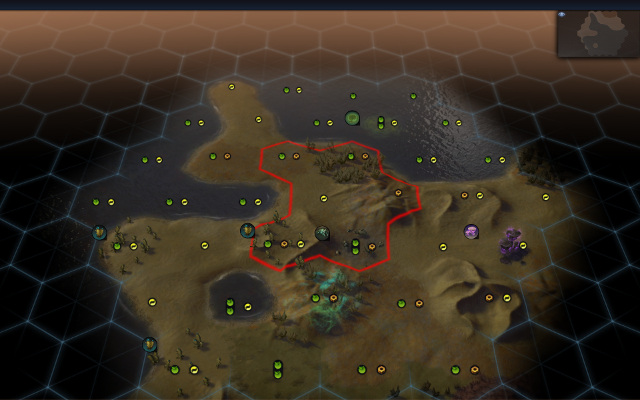
Once you take off and reach the new world, land your ship somewhere in the red area. There is a fragment of the map revealed, around it, along with the resources (such as the Floatstone, Algae or the Annelids) and the income that each of the fields yields so, consider your choice to make the development of your city optimal. Those with the Retrograde Thrusters on their ships can pick a spot in a much larger area.

On the bar above, there appear a number of icons that describe your colony. From the left to the right, these are:
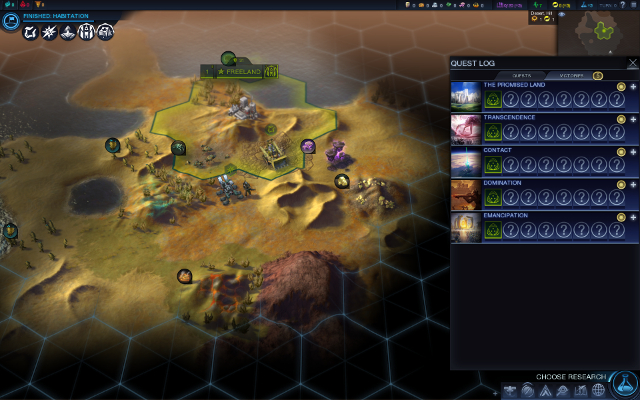
Your first city is your castle on the hostile planet. Right after you access the city screen, you will get to see the planned directions for its development. With appropriate amounts of energy, you can buy the fields that you need. Just like in the previous installments, it is best to found cities within the distance of, at most, three fields away from the resource fields because the will, of the city, to buy such a field, is inversely proportional to the distance. Apart from that, this increases the probability of the fields being seized by another city.
Probably, after several turns of exploration, aliens will take interest in you, which may, but does not have to, lead to conflicts. Nothing really happens if your city is fired at, by two or three units. Still, you should watch out, when you start to exterminate the aliens for good - this may alter their disposition towards your colony drastically.. That is, unless you have the technology and you start to.. tame them.
Right at the beginning select the city production and one of 6-7 available technologies to research into. Be prepared that your city is going to be the only one that you are going to have, for the next several tens of turns - high level of cultural, health, scientific and production development is the best thing you can strive for, because the planet may turn hostile towards you - a good idea is to build Relics, Clinics, Labs and Factories to reinforce the economy.
Start the exploration of the area with the Explorer. He can lead an Expedition on the revealed elements of the environment, such as Ruins or Wrecked Satellites. Expeditions may provide you with various benefits, such as culture, energy, Science points or affinity points. Sometimes, it may also start a mission.
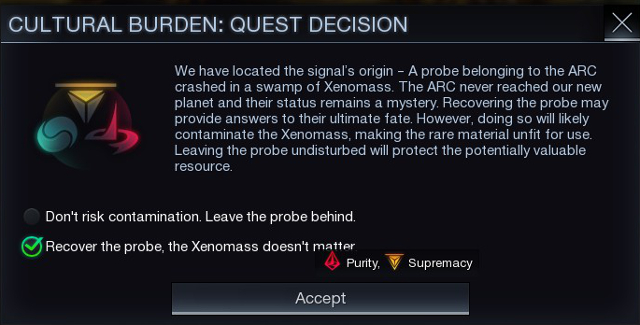
Missions appear during the game and they are a form of telling the story of colonization. Sometimes, these are complex storyline missions that require you to meet a requirement, such as exploring ruins or building a specific structure in the city. Completing these missions is rewarded. Usually with lots of energy, science, affinity points or a new technology.
Most often, however, these are micro-quests, where you need to pick one of the two available options, when you build a new structure. For example, for the Old Earth Relic there are two options - free maintenance or a free culture point.
Culture plays a vital role - it allows your cities to expand and allows you to buy Virtues. Virtues are special bonuses that affect your entire society and function in a way similar to the Social systems in the previous installments.
As soon as you have explored the land, you can consider a new city. Try to found it in the location that will allow build a trading route up to it, to be able to foster its development. The new city starts out as an Outpost - you cannot change the names of such objects. Several turns must elapse(five, at least) before the outpost turns into a city.
At this point, let us have a look at the Health meter - it performs the role of the Luck from the previous installments. If it nears 0, or goes below, it is high time that you built a Clinic or a Medical Lab and to back it up with appropriate Virtues.
Yours and the cities of the other nations can be connected with Trading Routes. Inside your own colony, they foster development - they provide production and food points. Between the cities of different nations- they provide you with energy and science.
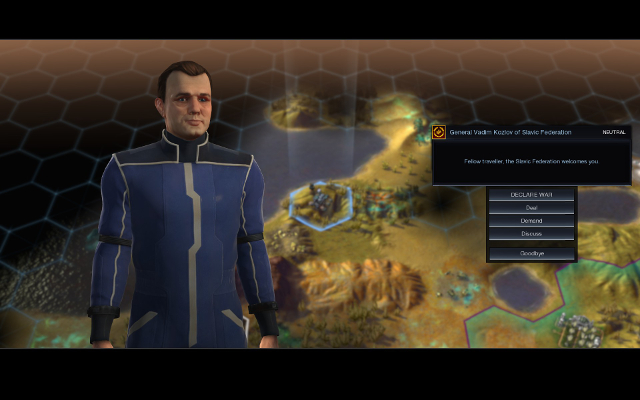
Between turns 10-40 there are more nations to appear on the planet - you will be able to see their capitals immediately. After you develop Computer sciences and build the national wonder - the Intelligence Agency you can dispatch your agents to the enemy cities, who will be able to perform espionage actions, such as technology and energy theft or incite rebellions. However, this requires time and Intrigue points, symbolized by violet rhombs, under the city's name. Each successful action provides you with more Intrigue, which expands your possibilities, such as setting the animals of the planet on that city, or detonating a bomb.
Sometimes, espionage is the only way to complete a mission - for example, when it is required for a mission, whose completing is required by the storyline.
With several cities, you need to ensure proper protection and making the land fit your needs. Build Farms and Energy generators and try to put to use resources, such as Oil or Titanium, because they are the components for orbital units. At the same time, it is a good idea to build roads or Magnetic Rail which provide you with high bonuses to energy and production in cities connected with the capital city. Apart from that, try to develop the Alien Biology which allows you to remove Miasma from the map, because trading units cannot cross the fields with Miasma. Unless you play with Harmony Affinity, at which point the Miasma becomes your ally, later into the game.
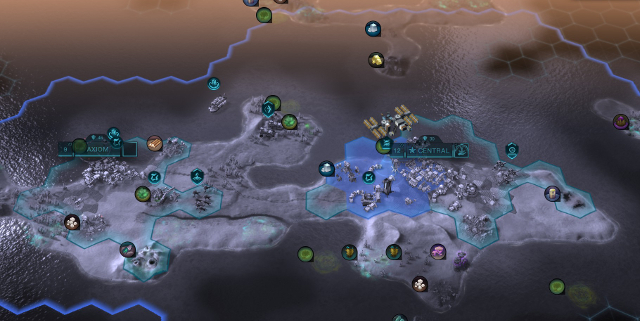
If possible, set support units on the orbit. A good example here is the Solar Collector, which provides with an energy point, everybody within reach. However, remember that the space above is limited. Each new satellite needs to be deployed with consideration.
At this point, you should already have some affinity points. You do not need to decide on one of them - each one provides interesting bonuses and you will be playing in accordance with a combination of various affinities, because some are very powerful.
With a affinity point you can upgrade your military. they will not be more expensive to produce, but this changes their looks and alters some of their features. After you upgrade them, you can choose one of two options. You can upgrade them only in the direction determined by your affinity but, if you have many points in various affinities, you can choose from among several options.
After you have ensured yourself with a stable development, it is time to pick the only right way and focus on it. Affinity points are very important - they allow you to unlock unique victory options.
As long as your technological development is fast and stable, you can search for the technology that provides enough affinity points. Thanks to this, you will quickly progress in the direction that you want, which allows you to win.
You can also attempt the Contact victory - i.e. to contact an alien civilization. You then need to discover an alien signal, by building an appropriate structure and by finding a fragment of an alien message, either in the ruins or thanks to the satellites.
The last recognized victory is Domination. All in all, it is you who is the best here and you rule the most important faction, don't you. Bring your opponents to their knees and defeat them with your military advancement and you will rule the entire planet. With a slight influence from the aliens, that is.
An additional way to win is the score victory, when the game ends after the predetermined number of turns. Usually, you do not achieve it, but it may happen that none of the players achieves victory in any of the ways and the game calculates the score. Therefore, it is a good idea to have a dozen-or-so Wonders built, which boost your overall score.

At the beginning, you can choose from among eight Sponsors - nations, that you can lead. There are upsides and downsides to each and determines, partially, your playing style. But with the multitude of options that you can choose from, at the beginning, you can form a society of your dreams.
By picking the crew, the ship and the cargo you can affect the game considerably, thanks to which the Sponsor bonus is a mere addition to the ones provided by the rest of the choices.
The majority of factions have no preference towards the specific path of development and they can be developed in any way, which provides you with lots of freedom.
Bonus: 10% to building of wonders, workers work faster, by 25%.
A nation that fares well in any field, although it is a bit held back - the bonus to wonder building points to the Score victory. A good combination here are Engineers or Scientists as the crew. For the beginner, it is not too good a choice, but in the hands of an experienced player it may work better.
Bonus: A free technology per each 10 adapted Virtues.
A nation that focuses on cultural development, which will allow you to develop in any way. This does not means that you can neglect all of the rest of the aspects of the game. Quite the opposite. Thanks to the virtues, you can improve your nation in many ways but, the bonus to additional research means that you will receive 2, 3 or 4 free technologies, during the game. It is a god idea to combine it with Artists as your crew. A good nation for beginners.
Bonus: Satellites stay on the orbit longer, by 20%, the first launching of an unit to the orbit provides a free technology.
A versatile nation, because the bonus does not affect the game too much. You can specialize in each area of development/ A free technology, although you get only one, is a good bonus that you often obtain early in the game, because you can discover the Solar Collector in some Container. The selection of the crew is up to you, although it is a good idea to focus on something well-defined. This nation is good for both beginners and the experienced players.
Bonus: The capital city has two Trading Routes more.
This nation has one of the better bonuses - additional Trading Routes is a formidable weapon, at the beginning of the game - provides you with lots of energy, research or production and food at the expense of one trading unit, which lends a great stimulus for the city development. Crew selection: any. It is recommended to the beginners and in the "battle of cities" mode. In the hands of an experienced player, this nation will throve.
Bonus: Cities expand 50% faster.
The Bonus of this nation is interesting and quite enjoyable - cities that expand faster, are faster to reach the resources far away. The crew choice: Scientists or Engineers are the preferred ones, because they boost the bonus. The cities expanding cities should be reinforced, because they have no preferred path of development. Recommended for beginners and for "battle of the cities".
Bonus: Espionage takes 25% less time and provides 25% more Intrigue points.
A great corporation has an eye for technology and espionage. The Bonus allows you to reach your objectives, in the enemy cities, faster so, the first thing worth researching into is the Computing, which allows you to build the Intelligence agency. The preferred crew choice: Scientists - they speed up the initial income to science. A good nation for the experienced player that allows for development in any direction.
Bonus: Units receive 10% more Strength in melee combat.
Brasilia has a bonus to fight, therefore the player should focus on the elimination of threats. All of them. A good way to develop is the way to Domination on the planet, or follow the path of Supremacy. Another good idea to pick the Engineers as the crew, because thy bolsters the formation of a strong army. A recommended faction for the experienced players, because fighting is challenging.
Bonus: 10% more food in cities if the colony is healthy.
The nation predisposed for fast development. Your colony's Health should be positive at all times, anyway so, keeping the bonus is easy. It is a bad idea to take the Refugees as your crew,, because you will have enough food anyways. Possible to develop in all fields. Recommended to players with some knowledge on the game, or the previous installments.
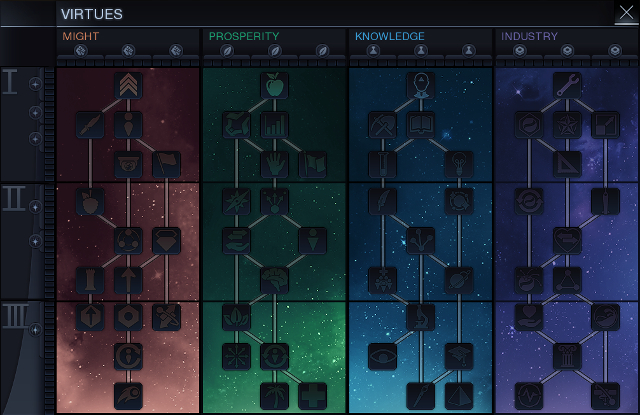
Virtues have supplanted the trees of social systems of the previous installments. Just like them, they provide bonuses that affect the entire colony, which translates into the overall advancement in the given direction. There are four of them.
Virtues, just like the systems before them, are obtained for the culture points, and each successive one is more expensive. Additionally, the cost of Virtues is influenced by the number of cities, because each new city raises the cost by 7%.
There are four paths of development to choose from: Might, Prosperity, Knowledge and Industry, which affect: Army, Social development, Cultural and Scientific development and Industrial and Energetic Development, respectively. Which branch you follow depends only on your playing style. Still, it is worthwhile to combine some of the trees, because some of the bonuses are considerable.
Regardless of which path you follow, you will always run into Virtues, which affect the majority of the nation's aspects. However, how they affect them, depends on the tree and the main aspect that it affects.
As additional bonus, for using Virtue points are Synergy bonuses, which depend both on your activity in a given branch, as well as on your activity at the given level of Virtues.
Synergy Bonuses of each branch have been described in the categories. The bonuses from the rows are allotted if in the verse in question, there is an appropriate number of Virtues. These are the following:
In the first row, there are: 6 virtues - pick an additional virtue, 10 virtues - 10% more energy and production in the capital city, 15 virtues - pick a free technology.
There are two in the second row: 8 virtues - pick a free virtue and recruit a new intelligence agent, 12 virtues - pick one free affinity tier.
In the third row, there only is one bonus for 10 virtues: + 10% food and +10 energy, production of culture and science in each city.
Might
The best choice if you play an aggressive game and you have the preference for the argument of power in all conflicts. Thanks to this tree, your armies obtain many interesting abilities and their actions reinforce the strife of your colony, in many walks of life.
Thanks to this tree, your army gains in strength and effectiveness, accompanied by the dropping costs of its maintenance. The army also affects the other aspects of your nation, such as covert operations, the amount of strategic resources, public health or the rate of scientific research. You will also obtain additional affinity points faster.
Synergy bonuses:
Prosperity
The tree that provides numerous bonuses to urban development, recommended to players that strive for the development of the lower and left ends of the technology net. Thanks to the virtues from this branch, workers fork faster and your cities develop faster, thanks to additional food and citizens.
Additional upsides are the free workers and settlers, improvement of trading routes, decreased cost of virtues and increased income from the basic resources (i.e. non-strategic ones, such as Chitin, fruit or Gold). Additional, free Health of the colony is also of high demand.
Synergy bonus:
Knowledge
The cultural and scientific development, guaranteed by this branch, speed up the advancement of your civilization. It is recommended that those, who focus on quick technological development, allot points to this branch. Thanks to these virtues, you will boost the income from science and culture and also some other, smaller fields.
Among them, there are such advantages as additional science from expeditions, decreased cost of the side technologies (i.e. the ones attached to the major breaks-through) increased health for the number of citizens and recruitment of an additional agent.
Synergy bonus:
Industry
Increased production, which allows you to build a strong empire is always needed. This tree ensures you with many bonuses that concern, mainly, boosting production (both while erecting buildings, wonders and building orbital units) and increasing income from energy.
Additional bonuses are increased income from trading routes, increased health of the colony, longer functioning of satellites, and lower cost of units. Still, the most powerful virtue is the one that adds 1% of energy per turn, which boosts your budget quickly.
Synergy bonus:
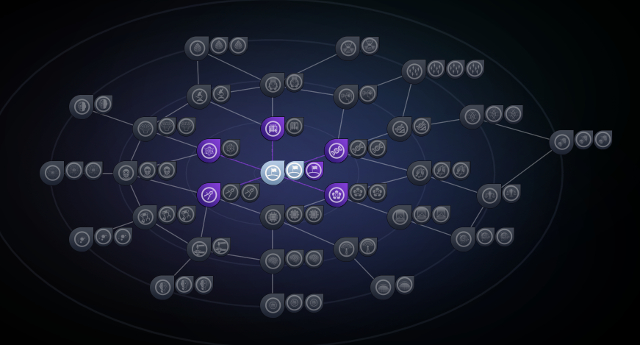
The technology tree is a thing of the past. This is the era of the net, which provides you with many more paths of development. You start in the very center with the technology of Building Houses. The decision which way to go, depends only on your situation, which you have formed while determining the game parameters.
On the net, there are Primary Techs, which are major breakthroughs in a given field. The farther up you go, the more you near biology, downwards - towards technology, to the left - production and nanotechnology, to the right - social development and Aliens. For each major technology, there are two secondary ones, which are detailed researches into one specific issue, in a given field. These technologies, sometimes, allow you to build a new unit, sometimes provide you with unique abilities and bonuses, allow you to obtain a point of a given affinity or provide you with access to a given building. However, a "secondary" research is 30% more expensive than a hub-research.
If you ignore that, however, you will soon notice that some of the secondary ones are required only by certain playing styles - a colony that adheres to the Affinity of Purity is not going to need the units of Supremacy or Harmony, and, for example, only the Harmonious want to learn Adding Miasma, which heals their units later into the game.
Unlike in the previous installments of Civilization, there is no urge to develop all technologies here. You can only follow one direction, or focus on what you currently need. Therefore, of you have no use for a technology, because you are not interested in its bonuses, you do not need to research into it.
Important technologies
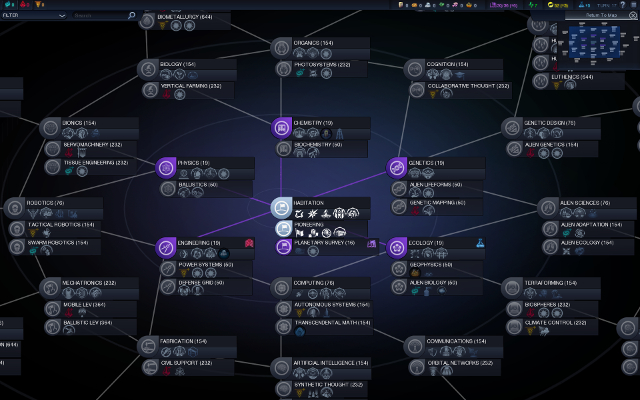
In general, you could say that all of them are important, but some are more important than the others. In this chapter, you can find the ones that provide some bonuses, and buildings that are worth having.
In general, all hub technologies are necessary, they do not provide bonuses to affinities, and they allow you to build important units and structures, which can be built, virtually, by every nation. Among them, the most important ones are the nearest technologies:
The important hubs also are:
Additionally, it is worthwhile to develop, at the beginning, several secondary technologies where the most important ones are:

Affinities are sets of rules professed by your society. These rules concern many of the basic aspects of the game, such as disposition of the aliens, the looks and behavior of your armies, or the looks of the cities. It affects the entire society, its shape and the general direction in which the colony follows.
On average, during the game, you will obtain, up to, several tens of affinity points and almost certainly, these will be the points from different paths. It is a good idea to mix them up, because the initial bonuses from each affinity are very useful. It is almost impossible to play the game without obtaining a single point of a affinity different than the preferred ones (congratulations to the persistent) because many of the key technologies are rewarded with a free point of a different affinity, e.g. the Alien Biology technology provides you with a free point of Harmony and you cannot refuse it.
Affinity points can be obtained in many ways. The basic one is technological development - on the web, there are many technologies marked with appropriate symbols. Secondly, there are missions that often reward you with a free point of a affinity.
Affinity points can also be obtained as a result of expeditions (rarely) and during the cultural development, after you fill one of the bonuses of the second row.
After you obtain 3-4 of a affinity, it becomes the dominating one and your cities start to change their looks. The affinity with less amount of points becomes the secondary one and, to a smaller extent, will also influence the looks of the cities.
The affinity of Purity professes the maxim: Humanism above all. Therefore, you will not find any combat mechs here and each alien creature is eliminated on the spot. The units have banners and other markings that bring the past epochs on the Earth and buildings start to resemble that standard buildings and skyscrapers.
Supremacy is the development of man for one end only - Domination of the rest of species, unimportant if they are own or alien. After some time, the mechs and cyborgs replace the regular army and dark spires replace colonial buildings.
If you think that living on an alien planet is so fascinating that you want to experience rustic life Harmony is your choice. The Harmonites modify their bodies, which is supposed to make them fit better, into the environment. After some time, your soldiers will be galloping on Beasts like on steeds, and cities will start to resemble nearby forests and mountains.
Civilization has always presented the players with a multitude of possibilities so, there is no one sure path to victory, because each of the players has his preferences. Some prefer to play fast, whereas the others develop without haste. Some prefer to reach the end in the peaceful ways, whereas others favor brute force. In other words - as many players - as many paths to victory.
In this chapter, you will learn about the general outlines, which you may follow, to be a step ahead of your opponents, on the path to victory.
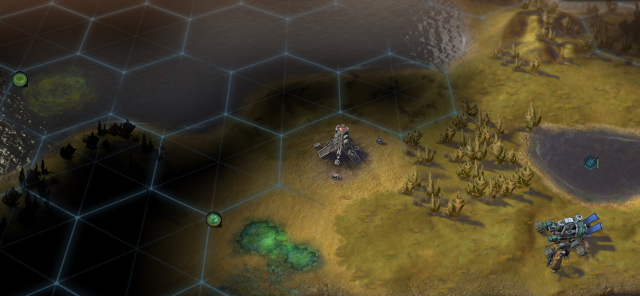
The knowledge about the surrounding world is worth its value in gold. At the very beginning, it is a good idea to dispatch your Explorer to explore the map, to discover as many new areas as possible, where you will soon found your cities.
In the new areas, you can discover new useful items, such as Containers, Ruins and Skeletons, where you can expedite, or Alien nests.
Discovering new lands, in combination with important technologies (Engineering, Chemistry and Geophysics) allow you to find all of the strategic resources, i.e. Xenomass, Firaxite, Floatstone, Titanium, Oil and Geothermal Energy. The first three are necessary to create units and buildings of Harmony, Supremacy and Purity respectively, whereas the last three are used for erecting buildings and the majority of orbital units.
At this point, it should be pointed out that the first tiers of affinities foster exploration. Harmony decreases aggression from the Aliens, thanks those of Purity the Explorers are invulnerable to the Alien attacks, whereas those of Supremacy enriches the abilities of the Explorers by one additional expedition.
Founding new cities should take place in the vicinity of all the possible resources and they should have access to water and the coast. The most important are the strategic resources, mentioned above, but the basic ones also may bring profit, in the future. The cities must be, at least, four fields apart, but I recommend that you found them even farther away from each other, thanks to which they can cover more area.
The center of the city should be, not farther away than three hexes, from the deposit of the resource that you want, because only then, will you obtain them within reasonable time. Of course, you can buy the fields, but this is expensive and, apart from that, this permanently raises the price on the fields in the cities.
If possible, try to defend your fields of Xenomass on the areas of your territory, that you have already discovered, because the planet, forms nests of aliens on them, every now and then. Nests spawn various aliens ranging from Raptor Bugs to the gigantic Siege worms, which are powerful units (thanks God they move only one field at a time!). Destroy all of the alien nests that you encounter to prevent being flooded by the enemy units.
It is a good idea to link the cities with the Capital, by means of roads and, after you invent the Mag Rail, link them with this one. This provides considerable bonuses: the road itself provides you with access to Energy, whereas the Rail provides a bonus to production. Additionally, moving over roads and by rail is much cheaper in Move points (or even free) irrespective of the type of the terrain.
Cities are the most precious treasure that you have. As often as possible, build upgrades around them, such as Farms, Mines, Quarries, Energy generators, Plantations or Paddocks. from the point of view of profits There is no point in building e.g. Biospheres and Terraclimates - it is time-consuming, they are expensive to maintain and they produce poor income.
In the cities themselves,, buildings should be the basic product. They improve on culture (e.g. the Old Earth Relic) and science (e.g. the Lab) as well as production (e.g. the Recycler) and energy income (e.g. Reactors). The Warehouses allow you to conduct Trading Routes to other cities. At the beginning, it is a good idea to link your own cities together, to foster their development and provide them with additional production and food.
Apart from these buildings, you should build each major wonder, such as the Gene Crypt, Panopticum or the Stellar Code. Each of these, apart from its own bonus for the city, also provides a bonus for the society, and adds 25 points to the overall score, if you fail to win before time elapses.
Building of military units may be your secondary aim, unless you want to kill out the Aliens, or they are really importunate. Still, at the very beginning of the game, you will not be able to fight them with your units, because your armies are terribly weak.,
It is a good idea to have a constant income of science points, which you achieve thanks to numbers of scientific buildings in cities, and by setting upgrades on the fields with Resilin, Silica and Firaxite. These points give you the option to research into new technologies quickly. And this is the point, because "the only right way" does not exist, just like in the previous installments, where you had to discover it all, regardless of what you were doing.
The web provides you with many more options, which translates into relative unpredictability of the game and at the same time, of the technological development. You can, e.g. land far away from the sea so, the technologies of seafaring are of no use to you. You may lack some resource in the vicinity, which translates into the development of the technology to obtain it.
In such situations, you need to judge for yourself; the question "What do I need the most, at present?" will often resound in your head. Your choices need to be considerate and well thought-out (at least, for a moment) because the game rarely allows you to develop all of the technologies during one game.
However, there are technologies that you cannot do without, which determine the colony's survival, in the first turns. These are: Engineering, Genetics, Ecology, Chemistry , Geophysics and Alien Biology
Virtues are a formidable weapon. It is a good idea to keep an eye on the tree of virtuesas soon as you get to choose your first Virtue, to determine what you are going to need for the current situation and your playing style.
When you have little area (e.g. the planet is an Archipelago) and sudden expansion is not possible, you can ignore the trees of Might and Prosperity and focus instead on Industry and Knowledge. However, when large paths of land are available, many Aliens around and you want to exact revenge for the destruction of your upgrades, by the Worm - the tree of Might is your choice.
At the same time, it is a good idea to pay attention to the Synergy Bonuses - you cannot obtain all the bonuses, within one game so, it is a good idea to focus on one tree and complement it with another one, to receive the bonuses that you are going to need the most.
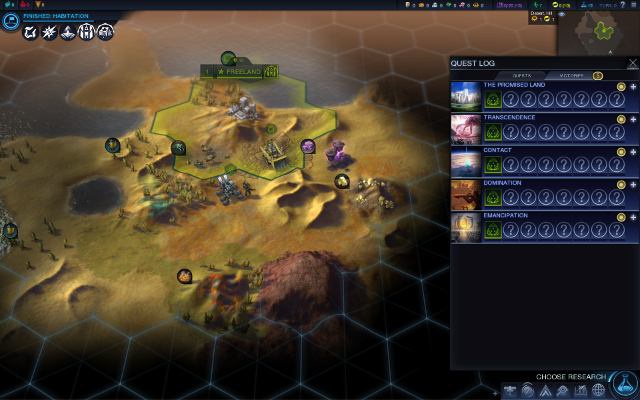
In this installment, there are five victories that you achieve during the game, plus one after you complete it, when nobody manages to end it in any other way.
The victories from the previous installments such as Diplomatic Victory or Cultural Victory are absent. As a matter of fact, there is no point in achieving the Scientific Victory, because the majority of the victories assume that you make discoveries. The only victory that has been present in the previous installments, is by Destroying all of the other players.
However, the new paths to victory show you how unique the new environment is - the alien planet presents you with new opportunities and many new ways to victory. All in all, you have been sent here to find out what can be found here and, to the extent possible, bring some help in.
Each victory has been described in the Task Panel and it is explained, just like any other mission - there are requirements that you need to meet, whose meeting pushes you towards winning the game that way.
Contact victory is the most scientific victory type. It requires you to find the Signal, decipher it and respond to that signal, which is followed by the Alien contact.
The basic condition is to find two signal fragments.
The easiest way is scientific development Computer sciences and then Transcendent Mathematics, to be able to build the wonder called Transcent Equation, which provides the first of the two required fragments. You find the second one after you launch the Orbital telescope, which discovers the second fragment heading towards the planet, after some time on the orbit.
You can also obtain a fragment as a reward for expeditions, but there are many objects to expedite on, on the map, where there are, say, two of them that reward you with a signal fragment so, it is sheer luck to find it this way.
Once you obtain both of the fragments, you will be able to Decipher the signal - it is a city project that provides you with the ability to build the Planetary Wonder - the Contact Beacon. The activation of the Beacon costs 1000 energy and uses up all the surplus energy. You can disable it, though if you need that energy. However, each energy unit, consumed by the Beacon takes you one step closer to victory...
The planet that you have landed on is amazing. The scientists of your colony claim that the planet, in itself, is sentient and they want to contact it.
To do that, you need to research into specific technological aspects: Nanorobotics,, Transgenics and Swarm intelligence. Researching into those will enable you, with time, to build the special wonder - the Mind Flower, which enables you to contact the planet.
The Mind Flower allows you to unify the mind of the planet with the minds of all the living beings on the planet, which takes some time. The Aliens and sometimes even the player's units may be unpredictable. You can speed this process up, by building appropriate structures in the cities. The Mind Flower, after it is destroyed, does not retain its progress so, you need to start everything over.
Transcendence is a unique Harmony victory and requires you to have obtained 13 points of this affinity.
You have left the Earth on a mission. You have promised to yourself that you find a new home for Humanity and you try to log the Earth from its fall. This is the direction that all your endeavors head.
The basic thing is to find out about the situation on the Earth. Therefore, you need to research into the technology of Communications and Orbital Networks. Then, build and launch a Lasercom Satellite.
After you have established the communications, you can start your preparations for the building of the interdimensional gate, which allows you to bring over people from the dying Earth, over to the New World. Therefore, you need to research into Nanotechnology.
The Exodus Gate is a Planetary Wonder. After you have built it, you can start building Earthling Settlements on the map and evacuate people from their home planet - the larger the map, the more people you need to evacuate.
The Promised land is the unique victory for the Purity and building the gate requires 13 points w of this affinity.
You have landed on a new planet and realized that the Earth is lost. Lost in its mistake, its politics and its system. It is high time to change it.
The knowledge, of what you left behind is indispensable to aid this situation. Therefore, try to build the Lasercom Satellite and to contact the Earth.
After you have obtained information on the Earth's grave condition, research into the technology of Hipercomputing to build the Emancipation Gate and send your military units to the Earth, where they will spread your affinity. Each unit that you transfer, adds to the pool of Stability Forces and takes you closer to the victory
Emancipation is the unique victory of the Supremacy so, it requires 13 points in that affinity.
The world is too small for everybody, who has landed on My planet.
Conquer, forcibly, the capitals of all the enemy nations, and the planet is yours and nothing stops you from making it into the paradise of your dreams. remember, though! You need to keep your initial capital, or recapture it from another nation, to win this way.
Nothing much to say here... you are late and the game needs to make up for you. Don't worry though. You end on the right position, if only you had lots of wonders and if you have been advanced enough.
The aliens have supplanted Barbarians of the previous installments. You probably could consider them some worse type of the opponent, because it is you, who is the master here. Still, throughout the initial 100-150 turns, it is them that reign the planet. They have powerful units and nearly inexhaustible supplies of resources that they create their units with.
With comparisons in mind, you could say that barbarians from the previous installments do not are no match for the aliens.
Descriptions of units, alongside their weaknesses and strong points.
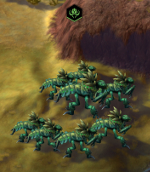
Wolf Beetle
Move: 2
Strength: 8
Resistance: low - up to three soldier attacks and then, they can take one attack only.
Typical cannon fodder, they come in packs and that is how they die. At the beginning of the game, moderately strong an unit. Later, they die after one shot.
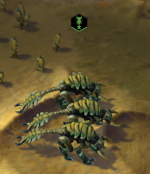
Raptor Bug
Move: 3
Strength: 14
Resistance: medium - up to four soldier attacks, then, can take two attacks at most.
A cavalry unit that fights at short range; fast and dangerous at the beginning, because it can kill, as many as, two soldier units, if they do not backup each other. Later into the game, the Harmonites can ride them.
.

Manticore
Move: 1
Strength: 4, Over distance: 10
Resistance: low - up to three soldier attacks, later, they can take one shot only.
A ranged-siege unit. Sluggish but, if allowed to shoot, it can wreak quite a havoc. Completely defenseless at short range.
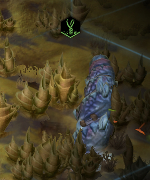
Siege worm
Move: 1
Strength: 48
Resistance: very high - at the beginning, it is nearly impossible to kill, the city needs to fire, at least, 10 times at it. Later into the game, 3-4- shots are sufficient.
An exceptionally strong unit that fights at close range. t the beginning of the game, you should steer clear of it, because the soldiers deal 1-2 damage to the bug, while taking 90. Later on, it will remain problematic but your units will be able to kill it a bit faster.
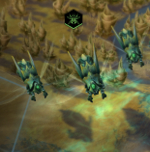
Drone
Move: 3
Strength: 10
Resistance: medium - takes three shots from the soldiers, later on, two at most.
The only airborne unit that fights at close quarters and spits acid. In general, it is quite weak, but it can decimate your forces.

Sea Dragon
Move: 4
Strength: 14
Resistance: high- at least, three gunboat shots. Only two, later on.
The weaker of the naval units, which can still damage gunboats and destroyers. It destroys the smaller units in one take. In general, a quite strong alien unit that proves lethal in groups. Rather vulnerable to aerial attacks.
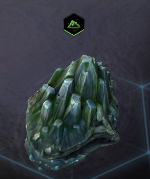
Kraken
Move: 2
Strength: 52
Resistance: Huge - just like the Siege Worm, impossible to kill, at the beginning. Even later on, this is a tough opponent - five, or six hits of a strong unit is usually the necessary minimum. It also is very resistant, Fortunately, it does not crop up too often and it does not have the tendency to attack in the peaceful stadium.
Singleplayer: Yes
Offline Co-op (hot seat): Yes
Co-op over the LAN/Internet: Yes
Multiplayer: Yes, up to 8 players
This guide has been drawn up for the PC version, on the computer of the below specifications:
The above specifications allowed a smooth gameplay with high details. The game discernibly slows down, during the final stages of the game, which is due to a greater number of calculations of units and cities.
Sid Meier's Civilization: Beyond Earth - PC minimum system requirements
Sid Meier's Civilization: Beyond Earth - PC recommended system requirements
Yes, it is possible to play Sid Meier's Civilization: Beyond Earth on laptop computers, it requires the Intel HD 3000 graphic card or better.




 Silent Hill: Homecoming Game Guide & Walkthrough
Silent Hill: Homecoming Game Guide & Walkthrough Sherlock Holmes vs. Jack the Ripper Game Guide & Walkthrough
Sherlock Holmes vs. Jack the Ripper Game Guide & Walkthrough Star Wars: The Force Unleashed II Game Guide & Walkthrough
Star Wars: The Force Unleashed II Game Guide & Walkthrough Sacred 2: Fallen Angel Game Guide & Walkthrough
Sacred 2: Fallen Angel Game Guide & Walkthrough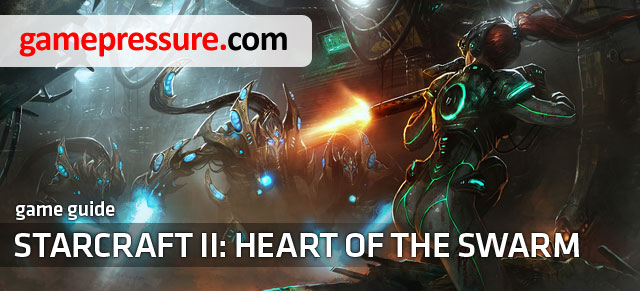 StarCraft II: Heart of the Swarm Game Guide & Walkthrough
StarCraft II: Heart of the Swarm Game Guide & Walkthrough